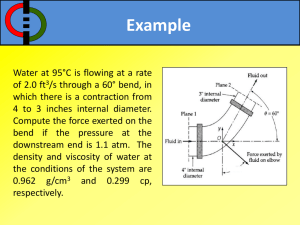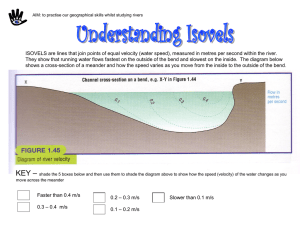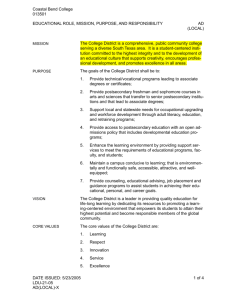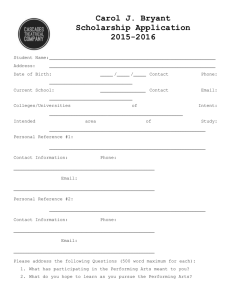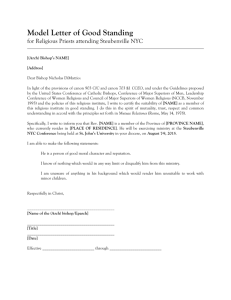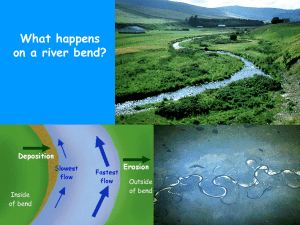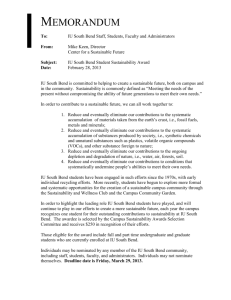SAMPLE Passage 1 – Informational Text Geology Fieldnotes: Big
advertisement
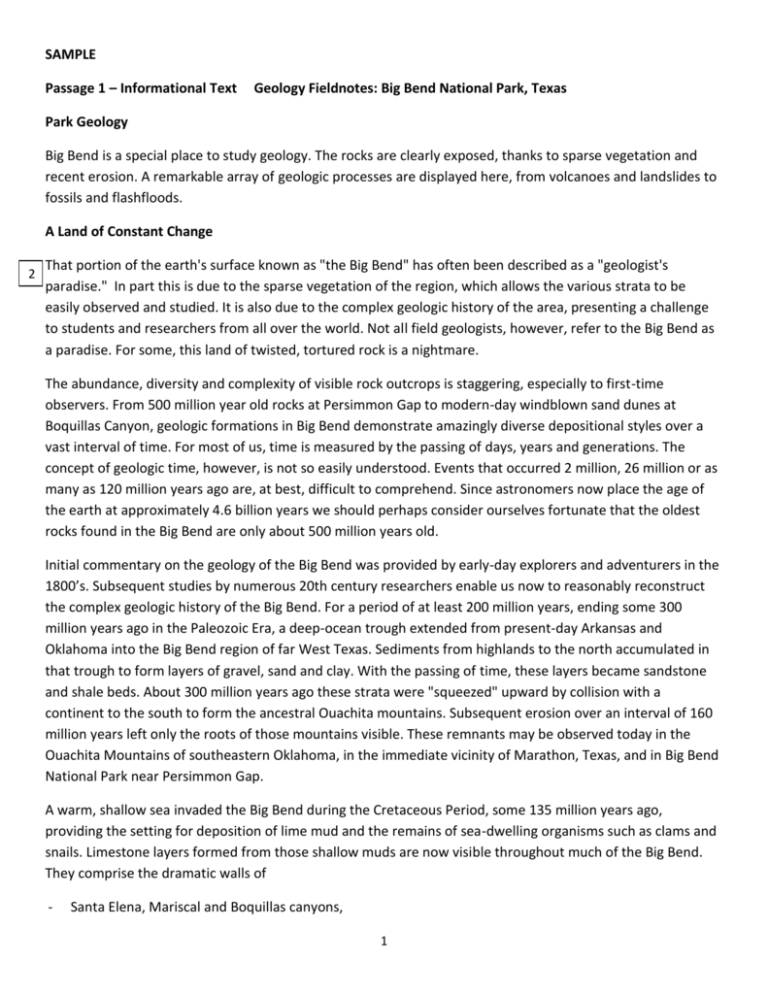
SAMPLE Passage 1 – Informational Text Geology Fieldnotes: Big Bend National Park, Texas Park Geology Big Bend is a special place to study geology. The rocks are clearly exposed, thanks to sparse vegetation and recent erosion. A remarkable array of geologic processes are displayed here, from volcanoes and landslides to fossils and flashfloods. A Land of Constant Change 2 That portion of the earth's surface known as "the Big Bend" has often been described as a "geologist's paradise." In part this is due to the sparse vegetation of the region, which allows the various strata to be easily observed and studied. It is also due to the complex geologic history of the area, presenting a challenge to students and researchers from all over the world. Not all field geologists, however, refer to the Big Bend as a paradise. For some, this land of twisted, tortured rock is a nightmare. The abundance, diversity and complexity of visible rock outcrops is staggering, especially to first-time observers. From 500 million year old rocks at Persimmon Gap to modern-day windblown sand dunes at Boquillas Canyon, geologic formations in Big Bend demonstrate amazingly diverse depositional styles over a vast interval of time. For most of us, time is measured by the passing of days, years and generations. The concept of geologic time, however, is not so easily understood. Events that occurred 2 million, 26 million or as many as 120 million years ago are, at best, difficult to comprehend. Since astronomers now place the age of the earth at approximately 4.6 billion years we should perhaps consider ourselves fortunate that the oldest rocks found in the Big Bend are only about 500 million years old. Initial commentary on the geology of the Big Bend was provided by early-day explorers and adventurers in the 1800’s. Subsequent studies by numerous 20th century researchers enable us now to reasonably reconstruct the complex geologic history of the Big Bend. For a period of at least 200 million years, ending some 300 million years ago in the Paleozoic Era, a deep-ocean trough extended from present-day Arkansas and Oklahoma into the Big Bend region of far West Texas. Sediments from highlands to the north accumulated in that trough to form layers of gravel, sand and clay. With the passing of time, these layers became sandstone and shale beds. About 300 million years ago these strata were "squeezed" upward by collision with a continent to the south to form the ancestral Ouachita mountains. Subsequent erosion over an interval of 160 million years left only the roots of those mountains visible. These remnants may be observed today in the Ouachita Mountains of southeastern Oklahoma, in the immediate vicinity of Marathon, Texas, and in Big Bend National Park near Persimmon Gap. A warm, shallow sea invaded the Big Bend during the Cretaceous Period, some 135 million years ago, providing the setting for deposition of lime mud and the remains of sea-dwelling organisms such as clams and snails. Limestone layers formed from those shallow muds are now visible throughout much of the Big Bend. They comprise the dramatic walls of - Santa Elena, Mariscal and Boquillas canyons, 1 - the entire range of the Sierra del Caballo Muerto (Dead Horse Mountains) and the magnificent cliffs of the Sierra del Carmen in Coahuila, Mexico, towering above Rio Grande Village Approximately 100 million years ago the shallow Cretaceous sea began a gradual retreat to its present location, the Gulf of Mexico. Sandstone and clay sediments that formed along the retreating shoreline are found in lowlands surrounding the Chisos Mountains. Shallow water strata of this episode contain the fossil remains of: - oysters, giant clams, ammonites, and a variety of fishes and marine reptiles Near-shore deposits in Big Bend have yielded: - petrified wood, fossil turtles and crocodiles-one almost 50 feet long! Deposits from further inland contain fossil remains of a variety of dinosaurs. Perhaps the most famous of Big Bend's fossil treasures from this period is the giant flying reptile, Quetzalcoatlus northropi, with a wingspan over 35 feet. (A replica of the bones of one wing is now on exhibit at the Panther Junction Visitor Center). Near the end of the Cretaceous Period, a west-to-east compression of the earth's crust marked the beginning of the second major mountain-building period in Big Bend. This compression, which began in Canada, moved gradually southward, uplifting and folding ancient sediments to form the Rocky Mountains. In Big Bend National Park, Mariscal Mountain represents the southernmost extension of the Rockies in the United States. Broad uplift punctuated by upward folding exposed both the erosion-resistant lower Cretaceous limestones and the less resistant overlying sandstones and clays to the onslaught of erosion. Limestone cliffs throughout the region continue to be eroded today; most of the more easily removed sandstone and clay is gone from the mountains. For almost 10 million years after uplift ended, non-marine sediments of the Tertiary period constitute the only record of events in the Big Bend. Dinosaurs had long been gone from the land, their places taken by a proliferation of mammals, many of whose remains have been found in Big Bend ... horses, rhinos, camels and rodents, as well as fossils of the plants on which they thrived. All was not to remain quiet for long. Near the present northwest boundary of Big Bend National Park, the first of a long series of volcanic eruptions occurred approximately 42 million years ago. Upwelling magma lifted the mass now known as the Christmas Mountains, fracturing and weakening over-lying strata, allowing massive outpourings of lava to spread across the land. The oldest volcanic rocks in Big Bend owe their origins to this eruptive cycle. Between roughly 38 and 32 million years ago Big Bend itself hosted a series of volcanic eruptions. Initial activity in this cycle centered in the Sierra Quemada, below the present South Rim of the Chisos Mountains. 2 Subsequent volcanic activity at Pine Canyon, Burro Mesa, near Castolon and elsewhere in the park is responsible for the brightly colored volcanic ash and lava layers of the lower elevations and for most of the mass of the Chisos Mountains. 14 Volcanic activity was not continuous during these eruptive cycles. Periods of hundreds of thousands or perhaps millions of years passed between eruptions. During the quiet interludes the forces of erosion carved new landscapes, many of which were destined to be buried under layers of ash and lava from later eruptions. Life returned to the land only to be displaced by future eruptions. Elsewhere in the Big Bend rising magma sometimes failed to reach the surface. Instead, it spread within existing layers of rock, uplifting and fracturing overlying strata. Once the magma cooled and crystallized it formed solid masses of erosion-resistant intrusive igneous rock which have now been exposed by erosion of the overlying material. Maverick Mountain, the Grapevine Hills, Nugent Mountain and Pulliam Ridge are among many examples in Big Bend of such "frozen" magma chambers. Beginning some 26 million years ago, stresses generated along the West coast of North America resulted in stretching of the earth’s crust as far east as Big Bend. As a result of these tensional forces fracture zones developed, which, over time, allowed large bodies of rock to slide downward along active faults. The central mass of Big Bend National Park, including the Chisos Mountains, from the Sierra del Carmen to the east to the Mesa de Anguila to the west comprises such a block of rocks dropped downward by faulting. Direct evidence of this faulting is readily observed at the tunnel near Rio Grande Village. There the limestone layer through which the tunnel passes is the same layer that forms the skyline of the Sierra del Carmen to the east, dropped down over 4800 feet by faulting. To the west, at the mouth of Santa Elena Canyon the highest elevation rises 1500 feet above the river, while at the parking area the same layer lies some 1500 feet below the surface. Displacement along these faults did not occur in a single event, rather in a series of lesser episodes of faulting punctuated by earthquakes. The 1995 magnitude 5.6 earthquake near Marathon, Texas, 70 miles north of Panther Junction indicates that the responsible stresses are still active. The Greek philosopher Heraclitus once said "There is nothing permanent except change" This phrase could have been directed to the Big Bend where geologic processes have been constantly changing the land for over 500 million years. Each time you return to Big Bend National Park it will be different, for with every passing day the land is indeed changing. ___________________________________________________________________________________ Questions for Passage 1 1. According to the selection, why has “the Big Bend” been described as a “geologist’s paradise”? a. Because it contains rocks b. Because many geologists vacation there c. Because sparse vegetation allows easy access to interesting strata d. Because there are many jobs for geologists there 3 2. What is the effect of the metaphors in the sentences below from paragraph 2? “Not all field geologists, however, refer to the Big Bend as a paradise. For some, this land of twisted, tortured rock is a nightmare.” a. b. c. d. They compare Big Bend to a contradictory dream world They emphasize the appeal and repulsiveness of the landscape They explain how Big Bend’s volcanoes erupt They express how interesting the landscape is to many people 3. How does the author connect ideas in the selection a. By describing geologic time periods b. By explaining the effects of volcanoes c. By comparing fossil remains to volcanic ash d. By giving descriptive geologic details about the topic 4. Which group of words from the selection best conveys the author’s tone toward the topic? a. remarkable, amazing, dramatic, magnificent b. paradise, fortunate, proliferation, thrived c. complex, challenge, staggering, nightmare d. invaded, retreating, uplifted, erupted 5. How does the author achieve his purpose? a. By using descriptive phrases to explain difficult ideas b. By using only formal scientific language to list data c. By using bulleted phrases to clarify ideas d. By using quotes from famous people to support facts 6. Which of the following best replaces the bold word “interludes” in paragraph 14? a. Pauses c. Happiness b. Preludes d. Interests 7. Which quote best demonstrates the main idea of the selection? a. “The oldest volcanic rocks in Big Bend owe their origins to this eruptive cycle” b. “For most of us, time is measured by the passing of days, years and generations” c. “Between roughly 38 and 32 million years ago Big Bend itself hosted a series of volcanic eruptions.” d. “A remarkable array of geologic processes are displayed here, from volcanoes and landslides to fossils and flashfloods.” 4 Passage 2 – Narrative Text Anna Karenina by Leo Tolstoy Stepan Arkadyevitch had learned easily at school, thanks to his excellent abilities, but he had been idle and mischievous, and therefore was one of the lowest in his class. But in spite of his habitually dissipated mode of life, his inferior grade in the service, and h is comparative youth, he occupied the honorable and lucrative position of president of one of the government boards at Moscow. This post he had received through his sister Anna's husband, Alexey Alexandrovitch Karenin, who held one of the most important positions in the ministry to whose department the Moscow office belonged. But if Karenin had not got his brother-in-law this berth, then through a hundred other personages--brothers, sisters, cousins, uncles, and aunts--Stiva Oblonsky would have received this post, or some other similar one, together with the salary of six thousand absolutely needful for him, as his affairs, in spite of his wife's considerable property, were in an embarrassed condition. Half of Moscow and Petersburg were friends and relations of Stepan Arkadyevitch. He was born in the midst of those who had been and are the powerful ones of this world. One-third of the men in the government, the older men, had been friends of his father's, and had known him in petticoats; another third were his intimate chums, and the remainder were friendly acquaintances. Consequently the distributors of earthly blessings in the shape of places, rents, shares, and such, were all his friends, and could not overlook one of their own set; and Oblonsky had no need to make any special exertion to get a lucrative post. He had only not to refuse things, not to show jealousy, not to be quarrelsome or take offense, all of which from his characteristic good nature he never did. It would have struck him as absurd if he had been told that he would not get a position with the salary he required, especially as he expected nothing out of the way; he only wanted what the men of his own age and standing did get, and he was no worse qualified for performing duties of the kind than any other man. Stepan Arkadyevitch was not merely liked by all who knew him for his good humor, but for his bright disposition, and his unquestionable honesty. In him, in his handsome, radiant figure, his sparkling eyes, black hair and eyebrows, and the white and red of his face, there was something which produced a physical effect of kindliness and good humor on the people who met him. "Aha! Stiva! Oblonsky! Here he is!" was almost always said with a smile of delight on meeting him. Even though it happened at times that after a conversation with him it seemed that nothing particularly delightful had happened, the next day, and the next, everyone was just as delighted at meeting him again. After filling for three years the post of president of one of the government boards at Moscow, Stepan Arkadyevitch had won the respect, as well as the liking, of his fellow-officials, subordinates, and superiors, and all who had had business with him. The principal qualities in Stepan Arkadyevitch which had gained him this universal respect in the service consisted, in the first place, of his extreme indulgence for others, founded on a consciousness of his own shortcomings; secondly, of his perfect liberalism--not the liberalism he read of in the papers, but the liberalism that was in his blood, in virtue of which he treated all men perfectly equally and exactly the same, whatever their fortune or calling might be; and thirdly--the most important point--his complete indifference to the business in which he was engaged, in consequence of which he was never carried away, and never made mistakes. On reaching the offices of the board, Stepan Arkadyevitch, escorted by a deferential porter with a portfolio, went into his little private room, put on his uniform, and went into the boardroom. The clerks and copyists all rose, greeting him with good-humored deference. Stepan Arkadyevitch moved quickly, as ever, to his place, 5 5 shook hands with his colleagues, and sat down. He made a joke or two, and talked just as much as was consistent with due decorum, and began work. No one knew better than Stepan Arkadyevitch how to hit on the exact line between freedom, simplicity, and official stiffness necessary for the agreeable conduct of business. A secretary, with the good-humored deference common to everyone in Stepan Arkadyevitch's office, came up with papers, and began to speak in the familiar and easy tone which had been introduced by Stepan Arkadyevitch. "We have succeeded in getting the information from the government department of Penza. Here, would you care?...." "You've got them at last?" said Stepan Arkadyevitch, laying his finger on the paper. "Now, gentlemen...." And the sitting of the board began. 9 "If they knew," he thought, bending his head with a significant air as he listened to the report, "what a guilty little boy their president was half an hour ago." And his eyes were laughing during the reading of the report. Till two o'clock the sitting would go on without a break, and at two o'clock there would be an interval and luncheon. It was not yet two, when the large glass doors of the boardroom suddenly opened and someone came in. All the officials sitting on the further side under the portrait of the Tsar and the eagle, delighted at any distraction, looked round at the door; but the doorkeeper standing at the door at once drove out the intruder, and closed the glass door after him. When the case had been read through, Stepan Arkadyevitch got up and stretched . . . and went into his private room. Two of the members of the board, the old veteran in the service, Nikitin, and the Kammerjunker Grinevitch, went in with him. "We shall have time to finish after lunch," said Stepan Arkadyevitch. "To be sure we shall!" said Nikitin. "A pretty sharp fellow this Fomin must be," said Grinevitch of one of the persons taking part in the case they were examining. Stepan Arkadyevitch frowned at Grinevitch's words, giving him thereby to understand that it was improper to pass judgment prematurely, and made him no reply. "Who was that came in?" he asked the doorkeeper. "Someone, your excellency, crept in without permission directly my back was turned. He was asking for you. I told him: when the members come out, then..." "Where is he?" "Maybe he's gone into the passage, but here he comes anyway. That is he," said the doorkeeper, pointing to a strongly built, broad-shouldered man with a curly beard, who, without taking off his sheepskin cap, was 6 running lightly and rapidly up the worn step s of the stone staircase. One of the members going down—a lean official with a portfolio--stood out of his way and looked disapprovingly at the legs of the stranger, then glanced inquiringly at Oblonsky. Stepan Arkadyevitch was standing at the top of the stairs. His good-naturedly beaming face above the embroidered collar of his uniform beamed more than ever when he recognized the man coming up. "Why, it's actually you, Levin, at last!" he said with a friendly mocking smile, scanning Levin as he approached. "How is it you have deigned to look me up in this den?" said Stepan Arkadyevitch, and not content with shaking hands, he kissed his friend. "Have you been here long?" "I have just come, and very much wanted to see you," said Levin, looking shyly and at the same time angrily and uneasily around. "Well, let's go into my room," said Stepan Arkadyevitch, who knew his friend's sensitive and irritable shyness, and, taking his arm, he drew him along, as though guiding him through dangers. Stepan Arkadyevitch was on familiar terms with almost all his acquaintances, and called almost all of them by their Christian names: old men of sixty, boys of twenty, actors, ministers, merchants, and adjutant-generals, so that many of his intimate chums were to be found at the extreme ends of the social ladder, and would have been very much surprised to learn that they had, through the medium of Oblonsky, something in common. He was the familiar friend of everyone . . . and when in consequence he met any of his disreputable chums, as he used in joke to call many of his friends, in the presence of his subordinates, he well knew how, with his characteristic tact, to diminish the disagreeable impression made on them. Levin was not a disreputable chum, but Oblonsky, with his ready tact, felt that Levin fancied he might not care to show his intimacy with him before his subordinates, and so he made haste to take him off into his room. Questions for Passage 2 8. Based on paragraph 5, what does the author mean when he uses the word “decorum”? a. Appropriateness c. Cheerfulness b. Hard work d. Inferiority 9. In the selection, what is the purpose of the sentences below from paragraph 9? “If they knew,” he thought, bending his head with a significant air as he listened to the report, “what a guilty little boy their president was half an hour ago.” And his eyes were laughing during the reading of the report. a. b. c. d. To display the serious tone of the selection as a whole To explain the atmosphere of the boardroom meeting To provide visual imagery To show Stepan’s playful attitude 7 10. What can be inferred from the statement below in the last paragraph? “Oblonsky, with his ready tact, felt that Levin fancied he might not care to show his intimacy with him before his subordinates, and so he made haste to take him off into his room.” a. The phrasing demonstrates the intelligence used by Stepan in this scene b. The phrasing displays how the statement contrasts with the description of Levin in the rest of the selection c. The phrasing maintains Stepan’s characterization as a heroic man d. The phrasing builds suspense over Stepan and Levin’s relationship and its relevance to the plot. 11. What can readers infer about Levin? a. He is visiting Stepan to give him support and some bad news b. He is angry and regretful about having to visit Stepan c. He feels excited and anxious about his visit with Stepan d. He feels remorseful when he is around Stepan 12. What is the effect of the author’s extreme use of optimism in the selection? a. It makes it clear that Stepan can never feel disgrace b. It suggests to the reader that Stepan will be forced to share his wealth c. It makes the reader expect people to be against Stepan in the board meeting d. It creates tension because it is exaggerated 13. What do Stepan’s interactions with others convey about his character? a. His ability to accept all of his friends’ wrongdoings b. His ability to navigate the politics of his time period c. His ability to befriend many types of people d. His ability to function despite his excessive complaining 8 Passage 3 – Poetry History Lesson by Natasha Trethewey I am four in this photograph, standing on a wide strip of Mississippi beach, my hands on the flowered hips 5 of a bright bikini. My toes dig in, curl around wet sand. The sun cuts the rippling Gulf in flashes with each tidal rush. Minnows dart at my feet glinting like switchblades. I am alone except for my grandmother, other side 10 15 of the camera, telling me how to pose. It is 1970, two years after they opened the rest of this beach to us, forty years since the photograph where she stood on a narrow plot of sand marked colored, smiling, her hands on the flowered hips of a cotton meal-sack dress. 14. The poem reflects history by using imagery that contrasts life in Mississippi before and after – a. A hurricane b. The Great Depression c. Racial Desegregation d. Summer 15. In lines 7 and 8, the poet uses a simile that has the ironic effect of making the minnows seem— a. Curious b. Threatening c. Benevolent d. Humorous 16. In lines 14 and 15, the “narrow plot/of sand” can be best interpreted as symbolic of— a. the speaker’s lack of empathy for her grandmother’s situation b. the grandmother’s restricted opportunities c. the grandmother’s limited perspective d. the speaker’s refusal to be bound to the past 9 17. What does the author mean when she uses the pronoun “us” in line 12? a. African Americans b. the general public Passage 4 – Poetry c. her extended family d. young women Fiction Passage from Les Miserables THE next morning at sunrise Monseigneur Bienvenu was strolling in his garden. Madame Magloire ran up to him in utter consternation. "Monseigneur, Monseigneur!" she exclaimed, "does your Grace know where the basket of silver is?" "Yes," replied the Bishop. "Jesus the Lord be blessed!" she resumed; "I did not know what had become of it." The Bishop had just picked up the basket in a flower-bed. He presented it to Madame Magloire. "Here it is." "Well!" said she. "Nothing in it! And the silver?" "Ah," returned the Bishop, "so it is the silver which troubles you? I don't know where it is." "Great, good God! It is stolen! That man who was here last night has stolen it." In a twinkling, with all the vivacity of an alert old woman, Madame Magloire had rushed to the oratory, entered the alcove, and returned to the Bishop. The Bishop had just bent down, and was sighing as he examined a plant of cochlearia des Guillons, which the basket had broken as it fell across the bed. He rose up at Madame Magloire's cry. "Monseigneur, the man is gone! The silver has been stolen!" As she uttered this exclamation, her eyes fell upon a corner of the garden, where traces of the wall having been scaled were visible. The coping of the wall had been torn away. "Stay! yonder is the way he went. He jumped over into Cochefilet Lane. Ah, the abomination! He has stolen our silver!" The Bishop remained silent for a moment; then he raised his grave eyes, and said gently to Madame Magloire: -- "And, in the first place, was that silver ours?" Madame Magloire was speechless. Another silence ensued; then the Bishop went on: -"Madame Magloire, I have for a long time detained that silver wrongfully. It belonged to the poor. Who was that man? A poor man, evidently." 10 "Alas! Jesus!" returned Madame Magloire. "It is not for my sake, nor for Mademoiselle's. It makes no difference to us. But it is for the sake of Monseigneur. What is Monseigneur to eat with now?" The Bishop gazed at her with an air of amazement. "Ah, come! Are there no such things as pewter forks and spoons?" Madame Magloire shrugged her shoulders. "Pewter has an odor." "Iron forks and spoons, then." Madame Magloire made an expressive grimace. "Iron has a taste." "Very well," said the Bishop; "wooden ones then." A few moments later he was breakfasting at the very table at which Jean Valjean had sat on the previous evening. As he ate his breakfast, Bishop Bienvenu remarked gayly to his sister, who said nothing, and to Madame Magloire, who was grumbling under her breath, that one really does not need either fork or spoon, even of wood, in order to dip a bit of bread in a cup of milk. "A pretty idea, truly," said Madame Magloire to herself, as she went and came, "to take in a man like that! and to lodge him close to one's self! And how fortunate that he did nothing but steal! Ah, mon Dieu! it makes one shudder to think of it!" As the brother and sister were about to rise from the table, there came a knock at the door. "Come in," said the Bishop. The door opened. A singular and violent group made its appearance on the threshold. Three men were holding a fourth man by the collar. The three men were gendarmes; the other was Jean Valjean. A brigadier of gendarmes, who seemed to be in command of the group, was standing near the door. He entered and advanced to the Bishop, making a military salute. "Monseigneur -- " said he. At this word, Jean Valjean, who was dejected and seemed overwhelmed, raised his head with an air of stupefaction. "Monseigneur!" he murmured. "So he is not the cure?" "Silence!" said the gendarme. "He is Monseigneur the Bishop." In the meantime, Monseigneur Bienvenu had advanced as quickly as his great age permitted. "Ah! here you are!" he exclaimed, looking at Jean Valjean. "I am glad to see you. Well, but how is this? I gave you the candlesticks too, which are of silver like the rest, and for which you can certainly get two hundred francs. Why did you not carry them away with your forks and spoons?" 11 Jean Valjean opened his eyes wide, and stared at the venerable Bishop with an expression which no human tongue can render any account of. "Monseigneur," said the brigadier of gendarmes, "so what this man said is true, then? We came across him. He was walking like a man who is running away. We stopped him to look into the matter. He had this silver -- " "And he told you," interposed the Bishop with a smile, "that it had been given to him by a kind old fellow of a priest with whom he had passed the night? I see how the matter stands. And you have brought him back here? It is a mistake." "In that case," replied the brigadier, "we can let him go?" "Certainly," replied the Bishop. The gendarmes released Jean Valjean, who recoiled. "Is it true that I am to be released?" he said, in an almost inarticulate voice, and as though he were talking in his sleep. "Yes, thou art released; dost thou not understand?" said one of the gendarmes. "My friend," resumed the Bishop, "before you go, here are your candlesticks. Take them." He stepped to the chimney-piece, took the two silver candlesticks, and brought them to Jean Valjean. The two women looked on without uttering a word, without a gesture, without a look which could disconcert the Bishop. Jean Valjean was trembling in every limb. He took the two candlesticks mechanically, and with a bewildered air. "Now," said the Bishop, "go in peace. By the way, when you return, my friend, it is not necessary to pass through the garden. You can always enter and depart through the street door. It is never fastened with anything but a latch, either by day or by night." Then, turning to the gendarmes: -"You may retire, gentlemen." The gendarmes retired. Jean Valjean was like a man on the point of fainting. The Bishop drew near to him, and said in a low voice: -"Do not forget, never forget, that you have promised to use this money in becoming an honest man." Jean Valjean, who had no recollection of ever having promised anything, remained speechless. The Bishop had emphasized the words when he uttered them. He resumed with solemnity: -"Jean Valjean, my brother, you no longer belong to evil, but to good. It is your soul that I buy from you; I withdraw it from black thoughts and the spirit of perdition, and I give it to God." 12 18. What plot event occurred the previous night? a. Valjean promised with solemnity b. the gendarmes retired c. the Bishop’s silver was stolen d. the Bishop helped a rich man gain fame 19. Why does the Bishop mention different types of forks and spoons? a. he believes pewter has an odor when eating b. he believes they should move on despite their misfortune c. he thinks the wood and iron are better for someone poor like him d. he thinks many materials will help his occupation 20. What is the meaning of the bold word stupefaction on page 3 of the passage? a. confusion c. fear b. hatred d. love 21. Why is Valjean suprised? a. he didn’t have to pay for his hotel room b. the Gendarmes discovered he had a basket from the flower garden c. Madame Magloire is not angry with him and the Bishop is angry with him d. he is released by the Gendarmes 22. What does the Bishop claim Valjean forgot? a. his table manners c. his silver utensils b. his sister d. his candlesticks 13 23. What can readers infer from the description of the garden on page 1 of the passage? a. the house is not properly maintained b. someone escaped over the wall c. the beauty of the garden fades with time d. the French craftsmen were not good 24. How much are the candlesticks worth? a. less than pewter c. less than wood b. less than iron d. 200 francs 25. What can readers infer from the following quote? "By the way, when you return, my friend, it is not necessary to pass through the garden. You can always enter and depart through the street door. It is never fastened with anything but a latch, either by day or by night." a. The latch is very strong b. The garden is more convenient than the street door c. The Bishop is trusting d. Only true friends are allowed to come through the street door 26. What is the connotation of the phrase “black thoughts” in the final paragraph? a. mysterious thoughts b. evil thoughts c. intelligent thoughts d. religious thoughts 14 KEY: 1. 2. 3. 4. 5. 6. 7. C B D A A A D 8. 9. 10. 11. 12. 13. A D D C D C 14. 15. 16. 17. C B B A 18. 19. 20. 21. 22. 23. 24. 25. 26. C B A D D B D C B 15
